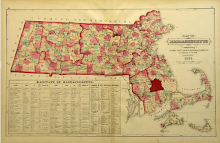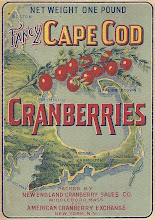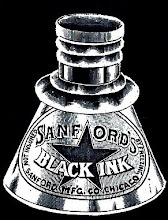During the hot summer of 1956, proposed construction of the Meadowbrook Drive-In on Route 44 in Middleborough touched off a heated war of words between Meadowbrook developers and owners of Middleborough’s sole in-town movie theater, the Middleboro Theatre, located on Nickerson Avenue across from Middleborough Town Hall. The result of the battle would ultimately be the closure of Middleborough’s only cinema and the local birth of the drive-in culture which had emerged rapidly following World War II.
Meadowbrook developers John J. Abberley and Wilbur S. Edwards first proposed construction of a drive-in theater with an ultimate capacity of 1,000 cars on a 183 acre tract acquired from George Lovell situated between Route 44 and Clay Street in early 1956. The proposed drive-in, named for its proximity to Poquoy Brook, was to include a children’s playground, snack counter and other amenities. In a now-dated bit of fifties advertising, it was noted at the time that "drive-ins are popular with young people who cannot afford a baby sitter, with old folks who can watch the show right from their car, and with those who find difficulty in parking their cars at an intown theater."
Middleborough Selectmen voted 4-1 to grant Abberley and Edwards a permit to operate, with only Manuel J. Silva dissenting, concerned about the adverse effect the resultant competition would have upon the Middleboro Theatre, whose business had been characterized as being "barely sufficient to continue its operation there." David Hodgdon, owner of the Princess Amusement Company which had operated the 42-year-old Middleboro Theatre since 1917 naturally was opposed the granting of the permit. Hodgdon characterized Meadowbrook as "a seasonal ‘fast-dollar- Drive-in" as contrasted with his "movie theatre operating the year round offering a definite high-quality service to the public." Hodgdon noted that his theater had been "extensively remodeled in 1948, cinemascope added in 1954 and with air-conditioning contracted for this spring." Hodgdon believed (ultimately rightly) that the construction of Meadowbrook would mean the demise of the Middleboro Theatre, noting that "a community without a conventional theatre in its business center is not a pleasant prospect for any town." Despite Hodgdon’s somewhat frenzied plea, Selectmen refused to budge.
Meanwhile, Meadowbrook’s developers took umbrage at what they considered to be a gross misrepresentation of their business upon the part of Hodgdon. "The owners and operators of the Meadowbrook Drive-In Theatre intend to bring to Middleboro a community center in which all the people of Middleboro can participate and of which they will be proud … We intend to show the finest in motion pictures, to have an attractive concession building with an outdoor patio, and a play ground for the youngsters. Our one desire is to make the Meadowbrook a neat, clean, attractive, wholesome family gathering place." Additionally, Abberley promised to make the drive-in available to community, civic, and church groups. During the succeeding years, Meadowbrook, in fact, would be utilized for fund-raising activities and during the summer of 1962 was even put to use for drive-in church services.
Adding insult to injury for Hodgdon, however, was the fact that not only was construction of Meadowbrook moving rapidly ahead for an anticipated June opening (it, in fact, did not open until May, 1957), but Lakeville Selectmen on May 25, 1956, had approved a second local drive-in to be located on Route 44 across Poquoy Brook from – of all places –Meadowbrook Drive-In, a curiosity noted at the time. "Many people have expressed the opinion that two drive-in theaters, side-by-side is enough of a rarity as to be considered odd." Odd or not, Middleborough and Lakeville were poised to have adjoining drive-in theaters by the summer of 1956.
While David Hogdon continued to oppose the Meadowbrook operation throughout 1956, developers of the proposed Lakeville drive-in (Grossman Industrial Properties, Inc., of Quincy which operated drive-ins at Brockton, Wareham and Quincy-Braintree) continued to forge ahead with their own plans for a second area drive-in, believing that Middleborough was large enough to support two such theaters. They remained unfazed by both the Meadowbrook project as well as the less than pleasant odors wafting over on certain days from the nearby Hotz Brothers mink farm which the farm’s owners believed might be detrimental to the operation of an outdoor theater.
With the prospect of two drive-in theaters on the horizon, Hodgdon had had enough. Later that summer, Hodgdon, after several newspaper battles with Meadowbrook’s developers, sold his interest in the Middleboro Theatre (which still remained without air conditioning). Attempts by local parties to revitalize the Middleboro Theatre – which urged potential patrons in 1958 "For the Best Enjoyment Go to a Conventional Theatre" – were unsuccessful. The theater was closed and the property sold in 1962.
Meadowbrook Drive-in opened on May 8, 1957, with a double bill featuring Friendly Persuasion and Wichita on its 44 by 100 foot screen, and operated as the sole drive-in in the vicinity, the Grossman project in Lakeville never getting off the ground despite much initial enthusiasm. "Watching the picture, viewers were convinced that television cannot generate the emotion created by the wide screen. Whole families sat comfortably in the privacy of their cars, tuned their individual receiver as high or low as they wished, and occasionally glanced around to enjoy the clear country air, the panorama of passing motorists on the highway and the colored lights in the theater area." (This last bit assuredly penned by Meadowbrook’s marketing man).
In retrospect, the Middleboro Theatre had had little hope of survival regardless of the arrival of Meadowbrook. During this period, the community was rapidly reorienting itself to an automobile-dominated culture and the year 1956 marked the dawn of the drive-in culture and the end of downtown as Middleborough’s sole commercial and entertainment center. Notably that year, the First National Supermarket opened its self-described "palace of foods" at the corner of South Main and East Grove Streets and touted its many features, conspicuously among which was the "spacious free parking," signaling a move by business away from downtown Middleborough to so-called more conveniently located sites situated elsewhere, leaving in its wake a number of casualties including the Middleboro Theatre.
Illustrations:
Vintage drive-in theater advertisements appear under a Creative Commons license. No rights reserved. For more vintage drive-in theater advertisements from the Meadowbrook Drive-In era , click here.

























+of+Smoky+Mountains+018.jpg)